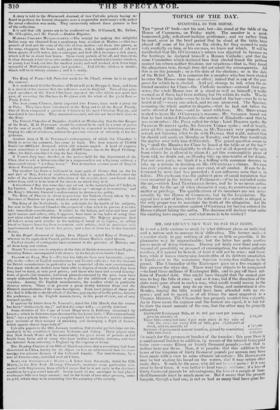O'CONNELL IN THE HOUSE.
TOPICS OF THE DAY.
THE "great 0" took—not his seat, but—his stand at the table of the House of Commons, on Friday night. The member is a good- humoured, jolly, roll-about-looking gentleman ; and we rather think he must, even in the brief period that he stood at the table, have played off some of his jests on the clerks, for they seemed to smile very cordially on him, or his excuses, we know not which. It will be recollected that Mr. O'CoNixELL's return was objected to because on the hustings he declared himself a Roman Catholic ; and that the same Committee which declared him duly elected found the petition against his return neither frivolous nor vexatious—that is, they found the allegations true, though they did not admit the consequences. All this is on the journals ; so is the date of the election; so is the date of the Relief Act. It is common for a member who has been elected to enter the House some time or other; indeed that is one of the pur- poses for which he is elected. And yet, strange to tell, when the re- turned member for Clare—the Catholic member—entered their pre- sence, the whole House was at a stand as well as himself ; it really seemed as if there had been nothing but Os within its walls. Was be to lie heard at the table—was he to be heard at the bar—was lie to be heard at all ?—every one asked, and no one answered. The Speaker, assuming the whole matter in dispute,—that he had not taken the oaths directed by law,—said lie must withdraw. Mr. BROUGHAM wished to learn Mr. OCoNNELL's reasons ; SUGDEN f01.111d. Out that he had violated Elizabeth—the statute of Elizabeth—and that he was no member. ; Mr. PEEL called for delay ; Lord MILTON spoke, Sir FRANCIS BURDETT spoke, Sir JOSEPH YORKE spoke ; and at length, after all this speaking, the House, as Mr.TIERNEY very properly ob- served, not knowing what to do with DANIEL that night, agreed that he should call again on Monday or Tuesday, and then they would talk the matter over with him deliberately. The grand question seems to be, " shall the Member for Clare be heard at the table or at the bar?" It is allowed that his eligibility to sit does not at all depend on the spot from which he is allowed to claim it; yet this contemptible piece of form will, we doubt not, on Monday take up nine-tenths of the debate. For our own parts, we think it is a trifling with common decency to take up a minute in deciding on Mr. O'CONNELL'S claims. No case has ever existed, no case can ever exist, at all similar. It can be de- termined by none that has preceded ; it can influence none that is to follow. His exclusion was the paltriest piece of small legislation that ever occurred in the history of Parliament, if lie be excluded under the act,—which Lord TENTERDEN denies, and he is no mean autho- rity. But be the act of what character it may, its construction is not matter of privilege. The qualifications of its members are not deter- minable by the House of Commons, but by the Legislature. The appeal to a court of law, where the infraction of a statute is alleged, is the only proper way to ascertain the truth of the allegation. Let the House direct a prosecution against O'CONNELL for having; entered the House without taking the oaths. The decision will declare what oaths the existing laws require; and what more is to be wished ?


















 Previous page
Previous page